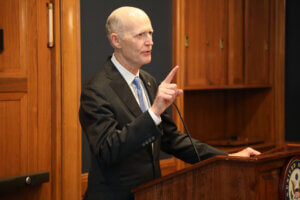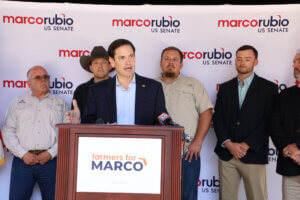December 2024 FloridAgriculture eNewsletter
Last month, the presidential election took place and sent a rippling effect across the State of Florida. This summary provides an overview of how this election season will impact the political arena in Florida.
Former President Donald J. Trump won the presidential election with 312 electoral votes compared to Vice President Harris’s 226 electoral votes. At the time of this publication, President-Elect Trump also won the popular vote by a margin of 76,881,964 votes (50.0%) to Harris’s 74,397,935 votes (48.4%). This is a first for a Republican nominee for President since George W. Bush in 2004.
As it relates to the State of Florida, President-Elect Trump won the state with 56.1% of the vote compared to Vice President Harris’s 43% of the vote. Trump won 61 out of 67 counties and in the process flipped some previously held Democratic strongholds like Miami-Dade, Hillsborough, and Duval County.

Along with that, U.S. Senator Rick Scott was on the ballot this year and was re-elected to the U.S. Senate by a margin of 55.6% to his opponent, Debbie Mucarsel-Powell’s 42.8%.
Additionally, the makeup of the Florida delegation in the U.S. House remained the same. All incumbents on the ballot were re-elected with the exception of Congressman Bill Posey, who retired this year. Congressman-Elect Mike Haridopolis was elected to his seat and will be a great successor to Congressman Posey. Florida Farm Bureau thanks him for his many years of dedicated service to his constituents and the State of Florida.
When the 119th Congress swears in next month in January, the U.S. Senate will be controlled by the Republican Party by a margin of 53-47. The U.S. House will also be controlled by the Republican Party with a projected majority of 220-215. With President-Elect Trump returning to the White House, there will be a united government in Washington, D.C. for the first time since 2017.
President-Elect Trump, his Cabinet and administration have started to take shape and some of his incoming team hail from the Great State of Florida. The first pick was tapping Congressman Michael Waltz to be the National Security Advisor. Congressman Waltz represents Florida’s Congressional District 6 and will resign to go work for the Trump administration. A special election date was set for April 1, 2025.

Next, Trump tapped U.S. Senator Marco Rubio to be the Secretary of State. With Rubio accepting this role, Governor DeSantis will be tasked with appointing someone to that seat until 2026 when a special election will take place.
Lastly, President-Elect Trump nominated Congressman Matt Gaetz to be the next Attorney General. Gaetz represents Florida’s Congressional District 1. He accepted the nomination and resigned from Congress the following day. A little over a week later, Matt Gaetz withdrew his name from consideration for Attorney General and will not be going back to Congress. A special election date has been set for that race on April 1, 2025.
With the presidential election now behind us, President-Elect Trump immediately began building out his White House team and making the necessary cabinet nominations.
Some that are relevant to the agriculture industry are listed below:
Brooke Rollins (Secretary of Agriculture Nominee)
Brooke Rollins is the CEO of the America First Policy Institute and served as director of the Domestic Policy Council during Trump’s first term. She has a strong focus on economic opportunities, rural revitalization and deregulation, making her a key advocate for market-driven agricultural policies. A native Texan, Rollins previously led the Texas Public Policy Foundation, where she focused on criminal justice and education reform. Her experience reflects a mix of grassroots policy work and high-level administration strategy.
Chris Wright (Secretary of Energy Nominee)
Chris Wright is the CEO of Liberty Energy, a leader in hydraulic fracturing technologies. A staunch advocate for American energy independence, Wright has spoken extensively about the benefits of domestic oil and natural gas production, particularly in reducing reliance on foreign energy. His leadership in energy innovation aligns with Trump’s focus on expanding fossil fuel infrastructure and reducing federal oversight on the energy sector. Wright’s expertise positions him to advocate for deregulation while promoting the growth of U.S. energy exports.
Lee Zeldin (Environmental Protection Agency Administrator Nominee)
Lee Zeldin, former U.S. Representative from New York and gubernatorial candidate, has a record of advocating for regulatory reform and economic growth. His approach to the Environmental Protection Agency focuses on balancing environmental stewardship with easing restrictions on industries such as energy, agriculture and manufacturing. Zeldin emphasizes the importance of localized decision-making over federal mandates and is expected to prioritize infrastructure projects and clean energy innovation while reducing bureaucratic hurdles.
Lori Chavez-DeRemer (Labor Secretary Nominee)
Lori Chavez-DeRemer, a U.S. Representative from Oregon, has a reputation for bipartisan collaboration, particularly on workforce development initiatives. Despite criticism from some conservatives for her support of the PRO Act, which strengthens union rights, Chavez-DeRemer has the backing of labor leaders and moderates for her pragmatic approach. Her leadership reflects a commitment to improving workforce conditions while fostering collaboration between businesses and labor unions.
These above listed members and other nominees will now have to be confirmed by the U.S. Senate.
The National Affairs office and Florida Farm Bureau want to congratulate everyone who ran for office and were successful in their endeavors. We look forward to working with these members and the President-Elect’s Team in Washington, D.C. to continue advocating on behalf of Florida’s farmers and ranchers.
